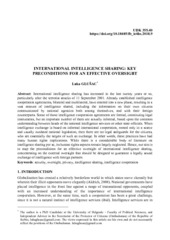International Intelligence Sharing: Key Preconditions for an Effective Oversight
Конференцијски прилог (Објављена верзија)
Метаподаци
Приказ свих података о документуАпстракт
International intelligence sharing has boosted in the last twenty years or so, particularly after terrorist attacks on 11 September 2001. Already established intelligence cooperation agreements, bilateral and multilateral, have entered into a new phase, resulting in a vast amount of intelligence shared, including the information on their own citizens communicated by national agencies both among themselves, and with their foreign counterparts. Some of those intelligence cooperation agreements are formal, constituting legal instruments, but an important number of them has actually been informal, based upon the common understanding between heads of the national intelligence services or other state officials. When intelligence exchange is based on informal international cooperation, rooted only in a scarce and usually outdated national legislation, then there are no legal safeguards for the citizens, who are essentially the targets of such exchange. In other words, these practices have had... many human rights implications. While there is a considerable body of literature on intelligence sharing per se, its human rights aspects remain largely neglected. Hence, our aim is to map the preconditions for an effective oversight of international intelligence sharing, concentrating on the external oversight that should be designed to guarantee a legally sound exchange of intelligence with foreign partners.
Кључне речи:
security / oversight / privacy / intelligence sharing / intelligence cooperationИзвор:
The Proceedings of the 4th International Academic Conference on Human Security, 2018, 83-88Издавач:
- University of Belgrade - Faculty of Security Studies
Колекције
Институција/група
IFDTTY - CONF AU - Glušac, Luka PY - 2018 UR - http://rifdt.instifdt.bg.ac.rs/123456789/2220 AB - International intelligence sharing has boosted in the last twenty years or so, particularly after terrorist attacks on 11 September 2001. Already established intelligence cooperation agreements, bilateral and multilateral, have entered into a new phase, resulting in a vast amount of intelligence shared, including the information on their own citizens communicated by national agencies both among themselves, and with their foreign counterparts. Some of those intelligence cooperation agreements are formal, constituting legal instruments, but an important number of them has actually been informal, based upon the common understanding between heads of the national intelligence services or other state officials. When intelligence exchange is based on informal international cooperation, rooted only in a scarce and usually outdated national legislation, then there are no legal safeguards for the citizens, who are essentially the targets of such exchange. In other words, these practices have had many human rights implications. While there is a considerable body of literature on intelligence sharing per se, its human rights aspects remain largely neglected. Hence, our aim is to map the preconditions for an effective oversight of international intelligence sharing, concentrating on the external oversight that should be designed to guarantee a legally sound exchange of intelligence with foreign partners. PB - University of Belgrade - Faculty of Security Studies C3 - The Proceedings of the 4th International Academic Conference on Human Security T1 - International Intelligence Sharing: Key Preconditions for an Effective Oversight SP - 83 EP - 88 DO - 10.18485/fb_ic4hs.2018.9 ER -
@conference{
author = "Glušac, Luka",
year = "2018",
abstract = "International intelligence sharing has boosted in the last twenty years or so, particularly after terrorist attacks on 11 September 2001. Already established intelligence cooperation agreements, bilateral and multilateral, have entered into a new phase, resulting in a vast amount of intelligence shared, including the information on their own citizens communicated by national agencies both among themselves, and with their foreign counterparts. Some of those intelligence cooperation agreements are formal, constituting legal instruments, but an important number of them has actually been informal, based upon the common understanding between heads of the national intelligence services or other state officials. When intelligence exchange is based on informal international cooperation, rooted only in a scarce and usually outdated national legislation, then there are no legal safeguards for the citizens, who are essentially the targets of such exchange. In other words, these practices have had many human rights implications. While there is a considerable body of literature on intelligence sharing per se, its human rights aspects remain largely neglected. Hence, our aim is to map the preconditions for an effective oversight of international intelligence sharing, concentrating on the external oversight that should be designed to guarantee a legally sound exchange of intelligence with foreign partners.",
publisher = "University of Belgrade - Faculty of Security Studies",
journal = "The Proceedings of the 4th International Academic Conference on Human Security",
title = "International Intelligence Sharing: Key Preconditions for an Effective Oversight",
pages = "83-88",
doi = "10.18485/fb_ic4hs.2018.9"
}
Glušac, L.. (2018). International Intelligence Sharing: Key Preconditions for an Effective Oversight. in The Proceedings of the 4th International Academic Conference on Human Security University of Belgrade - Faculty of Security Studies., 83-88. https://doi.org/10.18485/fb_ic4hs.2018.9
Glušac L. International Intelligence Sharing: Key Preconditions for an Effective Oversight. in The Proceedings of the 4th International Academic Conference on Human Security. 2018;:83-88. doi:10.18485/fb_ic4hs.2018.9 .
Glušac, Luka, "International Intelligence Sharing: Key Preconditions for an Effective Oversight" in The Proceedings of the 4th International Academic Conference on Human Security (2018):83-88, https://doi.org/10.18485/fb_ic4hs.2018.9 . .



